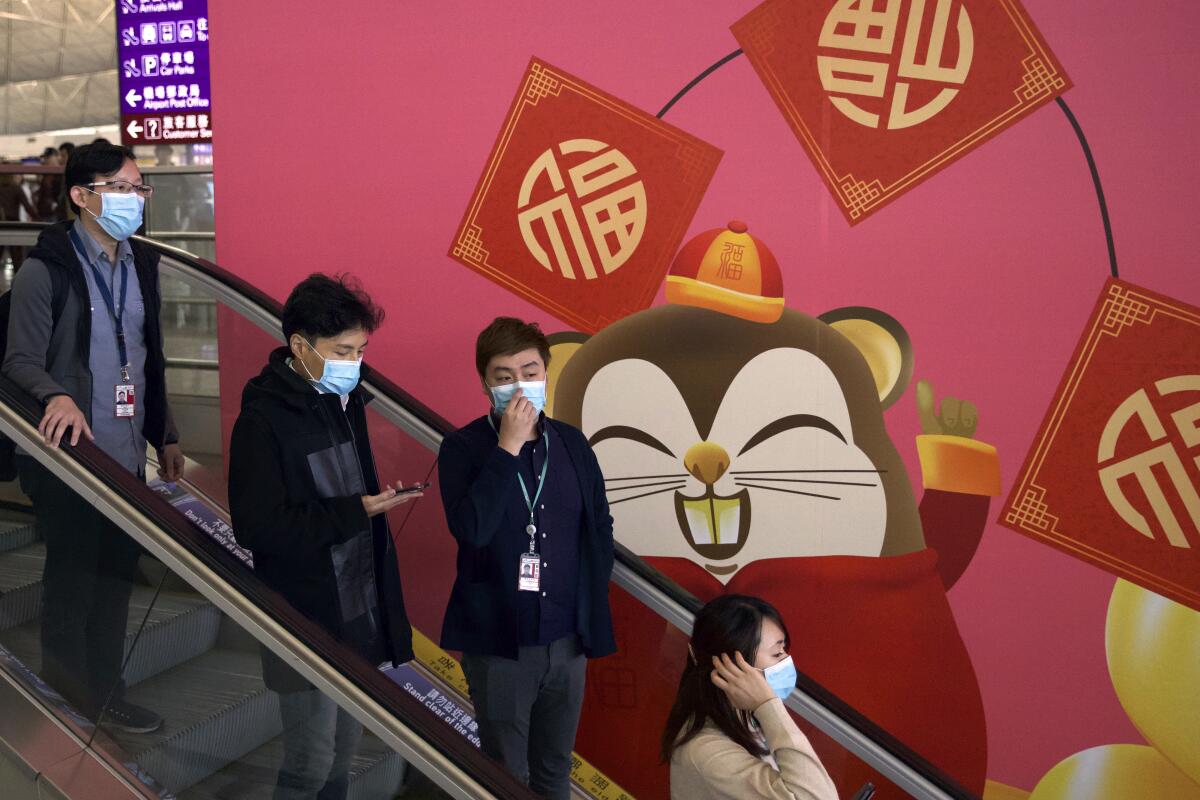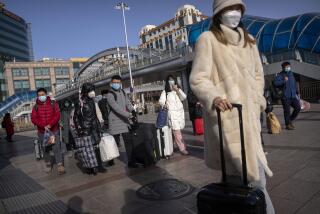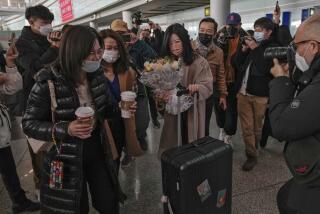China coronavirus: 440 cases reported, including 9 deaths, as millions travel for the Lunar New Year

BEIJING — As millions of Chinese people jam onto trains and planes, headed to their hometowns and overseas for the Lunar New Year in the world’s biggest annual mass migration, fears are growing that a new respiratory coronavirus could spread.
Chinese health authorities said Wednesday morning that the number of people killed by the outbreak had increased to nine and the number of cases had reached 440 since illnesses from coronavirus were reported in December. All the deaths occurred in Hubei province, whose capital, Wuhan, is the epicenter of the outbreak, officials said.
Li Bin, deputy director of the National Health Commission, told reporters that Japan and South Korea had confirmed one case each and Thailand three. The U.S. and Taiwan also confirmed one case each on Tuesday.
The outbreak began at a seafood and live animal market in Wuhan that sold bats, cats, marmots and other wild animals in addition to fish, according to public health officials.
Most early patients were linked to the market, where the virus is believed to have jumped from animals to humans. The confirmation of cases in other parts of China and beyond raised the specter of an outbreak on the scale of the SARS virus, which killed nearly 800 people and sickened about 8,000 in 2003, mostly in Asia.
In South Korea, a 35-year-old woman from Wuhan tested positive for the virus, called 2019-nCoV, one day after arriving at Seoul’s Incheon International Airport.
With China’s expanding wealth, air travel by its citizens has become increasingly common. Some use the time off from work around the New Year holiday to go abroad, forgoing the more traditional pilgrimage home.
Airports around the world are on alert. Travelers from Wuhan arriving at Los Angeles International Airport, San Francisco International Airport and New York’s John F. Kennedy International Airport are being screened, including filling out questionnaires and having their temperatures taken, said the U.S. Centers for Disease Control and Prevention, which has deployed about 100 additional staff members to the three airports.
Those with symptoms of the virus, which include fever, cough and difficulty breathing, will undergo additional health assessments, the agency said.
In Singapore, travelers arriving from China are being screened for fever. A 44-year-old Singaporean woman who had been to Wuhan was found to have pneumonia and was being treated and tested for coronavirus in an isolation ward — the seventh suspected case of the virus in Singapore.
The CDC said on its website that much about the virus remains unclear, from the severity of the illness to how it spreads. The risk to Americans remains low, the agency said, but officials are taking “proactive preparedness precautions.”
In some cases, the virus can cause pneumonia, severe acute respiratory syndrome, kidney failure and death.
Coronaviruses have a crown-like appearance under a microscope and are characterized by transmission from animals to humans. Some are no more serious than the common cold, while others can be deadly.
On Monday, a respiratory disease expert with the Chinese government said cases of human-to-human transmission had been confirmed, raising the possibility that the virus could spread rapidly.
Some medical workers have also tested positive for the virus, the English-language China Daily newspaper reported.
In addition to those in Wuhan, five people in Beijing, two in Shanghai and 14 in the southern province of Guangdong have been diagnosed with the new virus, according to Chinese health authorities. Most had ties to Wuhan, while two in Guangdong had close contact with other patients.
Chinese President Xi Jinping said that prevention and control of the outbreak is crucial, particularly because of the massive flow of Lunar New Year travelers.
Xi ordered maximum efforts to treat patients, identify the causes of the infection and its spread, strengthen monitoring and standardize treatments, according to the state-run New China News Agency.
Xi also said information should be released in a timely manner, and he stressed the importance of international cooperation.
Officials in Wuhan are restricting the flow of people leaving the city, Foreign Ministry spokesman Geng Shuang said at a news conference on Monday.
At Beijing’s West Station on Tuesday, railway travelers dragged heavy suitcases, bound for destinations across the country to celebrate the arrival of the new year on Saturday.
Some said they were not worried about the virus.
“It’s not close to here,” said a 26-year-old factory worker who gave only his surname, Wang, on his way to his hometown of Xian.
Wang wore a light blue surgical mask, saying he had a cold that he did not want to give to others.
Wang Pao, 35, who works in the service industry, said he had donned a gray surgical mask for his journey to Hebei province as a precaution against catching the virus. He said he feared it would spread with the millions of journeys taken during the holiday period.
“It’s the new year, so people are traveling all over the country,” he said.
Near a bank of automated ticket dispensers, a man in a white mask said the virus could easily take root in Beijing.
The man’s friend Hu Qihao, wearing a black mask, said he also was uneasy about the virus.
The two were headed to nearby Hebei province on the slow train, which would take four hours — but at least they had bought reserved seats.
“Beijing already has cases of the pneumonia,” said Hu, 21, who works at a liquor store.
Taiwan on Tuesday reported its first confirmed case of the virus, brought in by a Taiwanese woman who was recently in Wuhan, according to the island’s Central News Agency.
Memories of the SARS outbreak, which killed nearly 40 people on the island, are still fresh, said Lee Chun-yi, a legislator representing parts of the southern city of Tainan.
About 850,000 Taiwanese live in mainland China, government figures show, with many typically returning home to spend the New Year holiday with family.
Chiu Cheng-hsun, a professor and physician in Linkou Chang Gung Memorial Hospital’s pediatric respiratory department, said the island is vulnerable because of its proximity to China and the flow of business travelers and tourists to the mainland.
“Given this kind of background, if prevention is not done well, Taiwan could be the first place to be hit,” he said.
North Korea had stopped receiving foreign tourists as of Wednesday as a precaution against the virus, according to China-based tour operator Young Pioneer Tours. The vast majority of foreign tourists to North Korea come from China, a rare source of foreign currency for the isolated country that is not subject to international sanctions.
Times staff writers David Pierson in Singapore, Victoria Kim in Seoul, special correspondent Ralph Jennings in Taipei, Taiwan, and the Associated Press contributed to this report.
More to Read
Sign up for Essential California
The most important California stories and recommendations in your inbox every morning.
You may occasionally receive promotional content from the Los Angeles Times.











